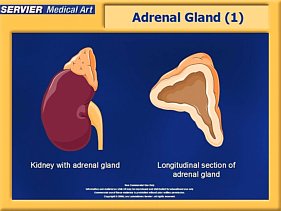Adrenal Medulla &
Adrenal Cortex Gland Sections,
Their Functions And Hormones.

The Adrenal cortex gland section plays a huge part in the adrenal/liver stress connection.
So important, and yet so many people have not even heard of the adrenal glands let alone what they do in the physiology of the body.
You may also see these small, orange triangular glands referred to as suprarenal glands.
There are two of them, each sits on top of a kidney, and is made up two separate parts, the adrenal cortex gland section which is the outer part and then the inner part is called the adrenal medula.
These hormones have a variety of functions:
They trigger :-
Stress response
Activate immune response
Regulate inflammation
Metabolise carbohydrates
Metalabolise protein
Regulate blood electrolyte levels
Of course, they are inextricably linked with behaviour and mood responses.
It is important to understand that the hypothymus, pituitary and adrenals are interdependent on one another and should be considered as a triangle of responses that each circulate to the next.
We will take the hypothymus as the first step.
When provoked by stress then it produces hormones that release corticotropin-releasing-hormones which is the hormone that stimulates the pituitary gland to produce corticotropin, which in turn triggers the adrenals to produce corticosteroid.
The adrenal gland cortex and the medulla both have their own separate parts to play
The adrenal medulla, which is the inner part of the gland, secretes hormones that are essential to how we cope stress, whether it be physical or emotional:
The first we know: Adrenaline - but is also known by the name epinephrine.
So what does adrenaline do exactly?

The most important and strong effect that it increases how forcefully your heart muscle contracts and so it makes it pump harder and faster.
When (and if you are daft enough to choose to) jump out of a plane and you feel the rush of your heart pounding in your chest.
This is adrenaline.
The reason that it happens is that your body wants to force the blood as fat as possible to your muscles and your brain in order that you can resond to the percieved danger as fast as you can. (That of course will be the ever-closer floor as you dive through the air!)
It also relaxes the so called smooth muscles of the body, this would be the walls of the blood vessels and kidney, liver and strangely your eyes.
Then it takes the enzyme which the liver manufactures and stores, called glycogen, and turns it into glucose so the body has a sudden blood-sugar rush to ensure that the body has adequate reserves for the respiration and general energy that it needs to survive the situation.
Norepinephrine (also called noradrenaline) - which does have some effects on the smooth muscle and metabolism,although to a much lesser degree. But what they do more effectively is tighten the blood vessels so they force your blood pressure up.
The function of adrenal cortex gland section is to produce corticosteroids.
You may have see these prescribed by the doctor, but in this case we are talking about the ntural hormone that is produced.
Adrenal Cortex Hormones - Corticosteroids
Hydrocortisone -which you may also see refered to as cortisol, looks after the way that your body uses up fat, protein, and carbohydrates.
Corticosterone - works alongside hydrocortisone, and together that suppress inflammation throughout the body,and affects how well your immune system works.
Aldosterone - regulates how much sodium is excreted into the urine, maintaining blood volume and blood pressure at the right levels.
Androgenic steroids - which have a small effect on the development of male characteristics.
From Adrenal Cortex Gland page back to the Home page of the aromatherapy website www.aromatherapy-natural-products.com